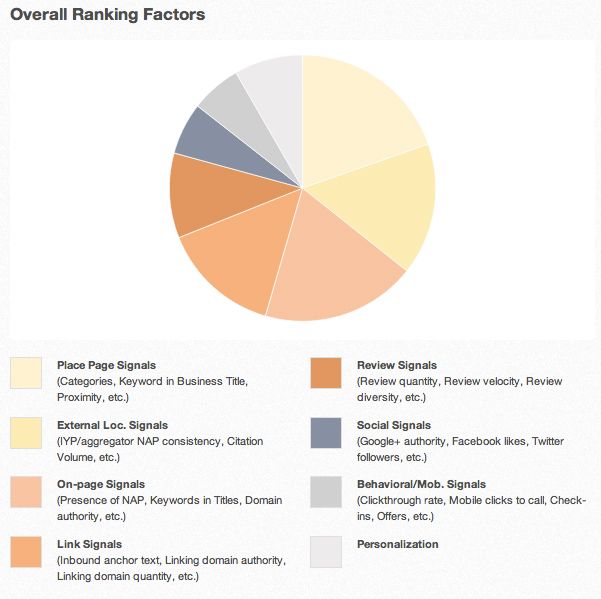If this is the very first time that you have ever heard of local search ranking factors, you can find a lot of information about them online. Below are a few of the highlights regarding the changes this year:
- This year is the groupÔÇÖs very first effort of helping readers distinguish between the signals that possess more or less prevalence, depending on the type of result that Google is showing (maps, carousel/pack, or localized organic).
- Given that a massive section of the audience for this survey over the many years has been agency representatives and agency owners, I have chosen to cater to this specific audience a little more this year. For those of you who have the fundamentals covered, pay special attention to the results.
- Of each one of the factors found on the list, this one will most likely be the most interesting to look at again in 2014, as experts and searchers alike become more familiar with innovative Google maps.
Basically, the primary factors seem to have stayed the same for the last few years:
- Proper associations of categories
- A physical address in the searched city
- High-quality, consistent citations from resources that are:
- Industry-relevant
- Trustworthy
- Authoritative
- Your information about NAP featured clearly on your site
- Your location as a primary keyword in headlines and title tags
- A smattering of reviews on third-party sites and Google
- A large selection of inbound, high-quality links
Here are just a few responses that are found to be particularly interesting:
- Despite the massively-hyped integration of Google Places and Google Plus platforms just one year ago (a procedure that is very far from being complete), social signals still seem to play a small part in the rankings ÔÇô about 6.3%. However, the consensus seems that the right place to start would be author tag implementation. This had been suggested as the number 22 priority in the competitive markets, versus number 34 as a foundation priority, and many experts had mentioned this in their comments.
- Maybe the most surprising element was that some of the reviews from the reviewers were rated as the number three competitive maker of differences. If you are within a competitive market, you are encouraged to pay attention to the Google City Experts program.
- As we are moving into a world where all maps are becoming the paradigm of local search, it is remarkable at just how little effect that the primary factors in search engine optimization are judged to have on the ratings.
- Meanwhile, Google is continuing to emphasize these elements within the localized organic results (which, according to the experts, is about 50%), which should be able to give businesses that don’t have a physical location some kind of measure of consolation.
As for the negative factors, business name keyword-stuffing and call-tracking numbers continue to be some of the greatest egregious offenses that you will make in a local search.
 

